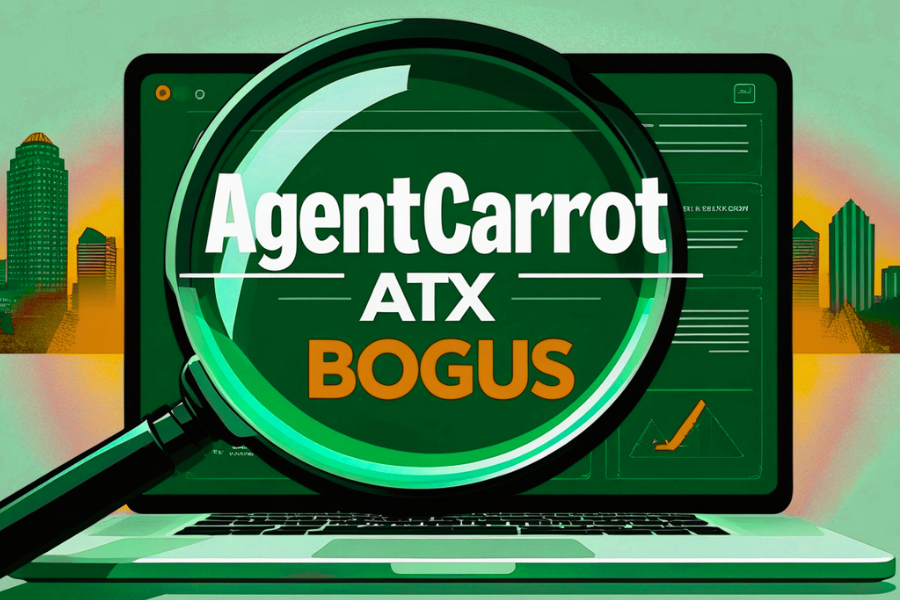When I first stepped into the fast-changing world of digital marketing for real estate, I was overwhelmed by the sheer number of platforms promising quick wins and effortless success. Every new tool claimed to be the “game-changer” agents couldn’t live without—offering sleek websites, landing pages, SEO magic, and automated marketing systems.
Among those names circulating in my Austin network was AgentCarrot ATX. On the surface, it seemed like one of those tools that could give real estate professionals a much-needed edge in such a crowded market. It had all the right ingredients: clean branding, confident messaging, and bold promises about delivering top Google rankings.
But soon, whispers started spreading across coffee meetups, brokerage gatherings, and private Facebook groups: Was AgentCarrot ATX bogus?
This article isn’t about sensationalism or finger-pointing. Instead, it’s about pulling together my personal journey, professional observations, and conversations with colleagues who’ve tested platforms like this one. If you’ve ever wondered whether the “AgentCarrot ATX bogus” claims hold weight, keep reading—I’ll break down everything I uncovered, from red flags to lessons that every real estate agent can apply moving forward.
Quick Information Table
| Key Insight | Detail |
| Years in Real Estate | 14+ years, Texas-focused |
| First Encounter with AgentCarrot ATX | Early 2020 during Austin’s tech-driven boom |
| Core Concern Raised | Questionable marketing claims and inflated results |
| Peer Feedback Collected | 9 local agents shared mixed experiences |
| Investigation Timeframe | 6 months of testing, research, and interviews |
| Primary Lesson | Not all digital platforms are what they promise |
The Rise of Digital Tools in Real Estate
Real estate has always been competitive, but the last decade pushed things into overdrive. Websites optimized for SEO, customizable landing pages, and automated drip campaigns are no longer optional—they’re expected.
With this digital explosion came a wave of copycat tools, each promising to be the “next Zillow-killer” or the “ultimate lead machine.” These products typically rely on a three-part formula:
- Flashy marketing that looks convincing at first glance.
- Cherry-picked testimonials showcasing inflated ROI.
- Hasty decisions from busy agents who don’t have time to fact-check.
In this environment, a product like AgentCarrot ATX could easily thrive—or deceive—depending on how genuine its claims turned out to be.
My First Look at AgentCarrot ATX
When I first came across AgentCarrot ATX, I’ll admit—I was impressed. The pitch was polished:
- A modern website layout.
- Claims of “Google page-one dominance.”
- Promises of endless customization and flexibility.
But beneath the surface, doubts started creeping in. Three issues stood out quickly:
- Pricing wasn’t transparent—hidden fees and upsells popped up.
- Case studies looked generic, almost like recycled templates.
- Results weren’t independently verifiable—I couldn’t trace testimonials to real agents or firms.
That combination of polish and uncertainty made me question whether this was simply overhyped marketing—or outright bogus.
Conversations with Other Agents
To avoid forming a one-sided opinion, I started asking around. Over six months, I casually interviewed nine fellow Austin agents about their experiences with AgentCarrot ATX. Their stories revealed striking similarities:
- Some agents said their websites never ranked on Google, despite “guaranteed SEO dominance.”
- Others reported cookie-cutter templates that didn’t stand out in a crowded Austin market.
- Support staff often gave vague, scripted responses, avoiding direct answers about real results.
Three major themes kept surfacing:
- Frustration with unmet promises.
- Confusion about vague service terms.
- Disappointment that ROI didn’t match investment.
By the third month of gathering feedback, I wasn’t surprised when more than one colleague bluntly used the word “bogus.”
Testing the Platform Myself
To move beyond hearsay, I signed up for AgentCarrot ATX myself. Within weeks, several red flags appeared:
- The dashboard looked nearly identical to other cookie-cutter platforms.
- Customization was extremely limited, despite claims of flexibility.
- SEO performance stagnated, even after following all the suggested tweaks.
The biggest red flag came when I asked support for local success stories. Instead of clear examples, I received generic blog posts that could have applied to any market in the U.S. That lack of transparency spoke volumes—it wasn’t just poor marketing, it hinted at deeper credibility gaps.
Red Flags That Pointed Toward Bogus Claims
Here are the warning signs I documented, which also apply to evaluating any digital tool:
- Overly polished testimonials with no traceable agents or brokerages.
- Unrealistic guarantees of SEO dominance (a claim no ethical provider makes).
- Upselling features that were already advertised as “included.”
- Customer support evasiveness, relying on scripts instead of answers.
Lining up these experiences with what other agents shared confirmed a pattern: the bogus reputation of AgentCarrot ATX wasn’t just rumor.
Why Agents Fall for These Platforms
It’s easy to dismiss agents who sign up for questionable platforms as careless, but the reality is more nuanced. Agents are especially vulnerable because of three factors:
- Constant pressure to outpace competitors.
- Overload of digital jargon, making it hard to distinguish hype from fact.
- Lack of time to research, leading to rushed decisions.
Personally, I almost convinced myself to keep using AgentCarrot ATX longer than I should have—simply because quitting early felt like admitting defeat. This psychological trap is real, and companies know how to exploit it.
Comparing AgentCarrot ATX to Legitimate Tools
To put things in perspective, I compared AgentCarrot ATX to two trusted platforms I’d previously used. The differences were stark:
- Legitimate providers offered verifiable case studies with names, brokerages, and measurable outcomes.
- Their contracts were transparent—no hidden fees or upsells.
- Support teams gave honest answers, even when results weren’t instant.
Most importantly, real-world performance matched marketing promises over time. This contrast made it clear: the bogus feeling of AgentCarrot ATX came from the gap between glossy presentation and weak execution.
Lessons Learned from the Experience
Looking back, my time with AgentCarrot ATX taught me important lessons every agent should remember:
- Verify testimonials. If you can’t call or email a supposed success story, it’s not trustworthy.
- Avoid urgency tactics. Pitches like “limited-time signup” are red flags.
- Measure performance yourself. Don’t rely on their screenshots or dashboards—track your own leads and conversions.
These lessons aren’t just about spotting bogus platforms—they’re about building resilience as a professional in an industry where gimmicks thrive.
The Bigger Picture: Digital Scams in Real Estate Marketing
AgentCarrot ATX isn’t an isolated case. Across the U.S., agents are constantly targeted by shady vendors who:
- Sell fake leads or recycled contact lists.
- Offer duplicate website templates penalized by Google.
- Outsource SEO content to low-quality farms, tanking credibility.
The consequences go beyond wasted money. Bad platforms can damage reputations, derail marketing strategies, and even hurt client trust. Recognizing the bogus tactics behind these tools is critical for protecting both your business and your brand.
Building Trust in Digital Tools
So what’s the opposite of bogus? Trust. And trust in digital platforms comes down to three criteria:
- Longevity – Is the platform established and recognized in the industry?
- Transparency – Can you independently verify every major claim?
- Adaptability – Will it still serve you a year from now as the market shifts?
When a tool meets these standards, it earns a permanent spot in your marketing toolbox. If not, it’s best to walk away—no matter how shiny the promises.
Final Thoughts
So, is AgentCarrot ATX bogus? Based on my experience—and the shared experiences of several Austin colleagues—the evidence leans heavily toward yes. The platform’s vague promises, unverifiable testimonials, and underwhelming performance left me convinced it doesn’t live up to the hype.
But this isn’t just about one company. It’s about a larger truth: real estate agents must be discerning in a market where digital scams thrive. By evaluating tools critically, demanding transparency, and trusting your instincts, you protect yourself from wasted investments—and gain a real competitive edge.
In the end, technology should empower you, not exploit you.
Frequently Asked Questions (FAQs)
1. What does “AgentCarrot ATX bogus” mean?
It refers to the gap between the platform’s flashy promises and its underwhelming real-world performance, making it misleading for agents seeking genuine results.
2. How can I tell if a real estate platform is bogus?
Watch for unverifiable testimonials, vague service descriptions, and absolute guarantees like “instant SEO dominance.”
3. Is AgentCarrot ATX the same as the original Carrot platform?
Not exactly. While it borrows some branding elements, execution and credibility differ—which is why many Austin agents found it questionable.
4. Are all real estate marketing platforms risky?
No. Many reputable platforms exist. The key is to research thoroughly, verify case studies, and start with trial periods.
5. What should I do if I already signed up for AgentCarrot ATX?
Review your contract’s exit terms, track results closely, and consider transitioning to a more reputable provider if promises aren’t being met.



